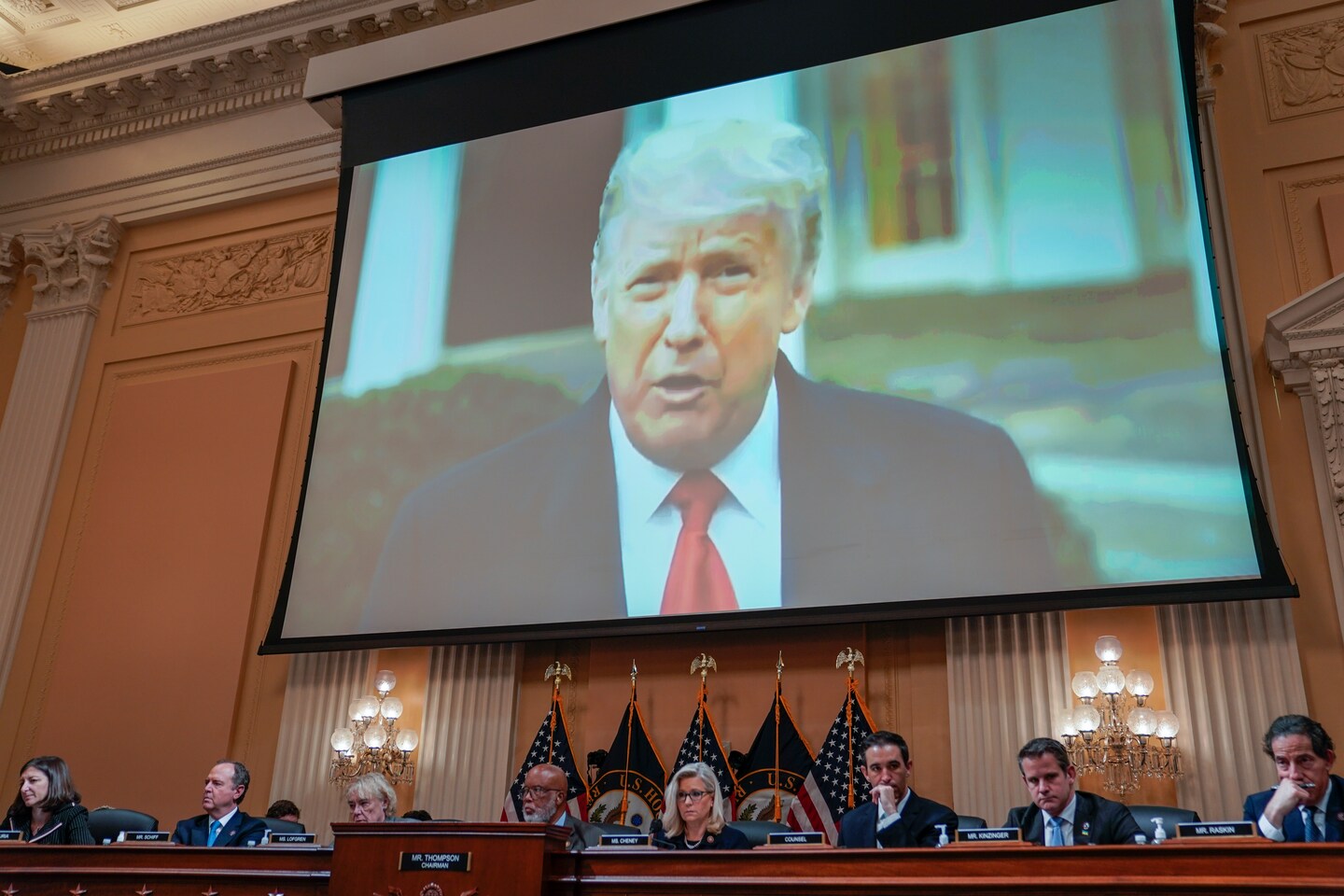If any criminal referrals come out of the Jan. 6 committee’s investigation, witness tampering could be a big one. At the end of Tuesday’s hearing, the committee shared messages they said two of their witnesses received urging them not to testify to the committee.
What is witness tampering? And could this charge apply to Trump?

“What they said to me is as long as I continue to be a team player, they know that I’m on the team, I’m doing the right thing, I’m protecting who I need to protect, you know, I’ll continue to stay in the good graces in Trump world … And they have reminded me a couple of times that Trump does read transcripts and just keep that in mind as I proceed through my depositions and interviews with the committee.”
She also quoted a witness describing a call they received:
“[A person] let me know you have your deposition tomorrow. He wants me to let you know that he’s thinking about you. He knows you’re loyal, and you’re going to do the right thing when you go in for your deposition.”
“I think most Americans know that attempting to influence witnesses, to testify untruthfully, presents very serious concerns,” Cheney said.
But what is witness tampering, exactly?
It requires three things be present, said white-collar criminal lawyer Jack Sharman, who served as a special counsel to Congress during its investigation of President Bill Clinton.
1. That there is a proceeding going on, like a grand jury (or, in this case, a congressional hearing).
2. That there is an intent to influence witness testimony in that proceeding.
3. That the intent is wrongful, meaning the person wanted to prevent the truth getting out to avoid being accused of wrongdoing. (The statue says: “whoever knowingly uses intimidation, threatens, or corruptly persuades another person.”) “I tell people that lawyers attempt to obstruct Congress all the time,” Sharman said. “The question is whether it’s wrongfully or corruptly.”
How often is a crime like this prosecuted?
Not very often. Sharman said that the majority of witness tampering cases happen in the context of a judicial proceeding, like a grand jury. It’s rare to have these cases revolve around someone preventing testimony to Congress. (In 2019, Trump ally Roger Stone was convicted of lying to Congress and witness tampering. He was going to go to jail before President Donald Trump granted him clemency.)
That doesn’t mean these kinds of prosecutions can’t happen; it just means the Jan. 6 committee could be fighting an uphill battle if it refers such a case to the Justice Department.
The Jan. 6 committee has referred four people to the Justice Department for prosecution so far — all for contempt of Congress charges, for refusing to comply with a subpoena to testify. The Justice Department has prosecuted two: former Trump political adviser Stephen K. Bannon, who faces a trial this month; and former White House adviser Peter Navarro.
What’s Trump’s potential liability?
It’s unclear. The committee shared only two messages that it said witnesses received from Trump allies. We don’t know the identity of the witnesses who received these messages or who sent them — and, crucially, whether the senders were acting at Trump’s behest. Cheney said the committee would reveal more in later hearings.
But the seeds are there for a witness tampering charge, either against the president or the people who made the calls, said Jeffrey Jacobovitz, a prominent white-collar criminal lawyer. “To me it’s clear tampering if an upcoming witness is told the president reads the transcripts,” he said. “The person who called engaged in tampering. If Trump encouraged or asked someone to make the call, he would be criminally liable, as well.”
One of the messages the committee shared said that “Trump does read transcripts” — meaning, the former president will be following your testimony very closely. Jacobovitz said that alone could tie Trump directly to these allegations.
And Trump has a long history of pressuring witnesses who must testify about him or his business practices in one of his many legal disputes, report The Post’s Rosalind S. Helderman, Josh Dawsey and Jacqueline Alemany.
With regard to the Jan. 6 committee, The Post and other media outlets reported that former top White House aide Cassidy Hutchinson was one of the people whom Trump world tried to influence with calls before her testimony.
If that’s true, it would be significant. Her testimony has been crucial to the Jan. 6 committee investigation. She testified four times in taped interviews and for more than two hours live on Tuesday, painting a picture of a president who wanted to stay in power at all costs, even at the risk of political violence. If there was an attempt to influence Hutchinson’s testimony that could raise the stakes for the Justice Department to investigate and prosecute.
The committee has also hinted at the possibility that Trump engaged in witness tampering with House Minority Leader Kevin McCarthy (R-Calif.), noting how McCarthy’s statements since the attack have changed over time to become more Trump-friendly. Committee chair Bennie G. Thompson (D-Miss.) wrote a letter to McCarthy asking, “At that meeting [on Jan. 28], or at any other time, did President Trump or his representatives discuss or suggest what you should say publicly, during the impeachment trial (if called as a witness), or in any later investigation about your conversations with him on January 6th?”
McCarthy said such conversations “never happened” but acknowledged that if they did, they would probably be illegal.






